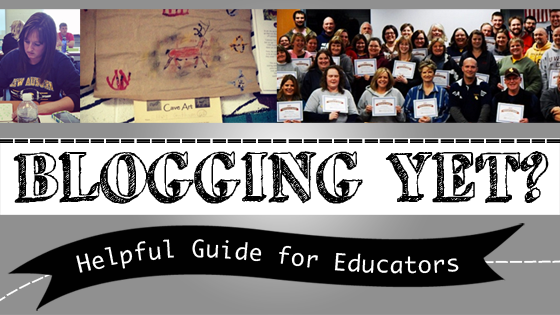Blogging.
The word probably makes your palms sweat, your head hurt, or both. You have enough to do as an educator; how could you possibly have time to create a website, come up with ideas for what to write about, and put together the finished articles on a routine basis?
I get it. So let’s start at the beginning. Why should you start blogging?
- Blogging is the most popular way of communicating and spreading information and news.
- It’s an incredible way to express yourself and share information with others.
- You develop powerful writing skills.
- You are building your educational resume for future opportunities.
The list can go on from there. Blogs can create an income stream for many, but don’t pressure yourself with that aspect now.
One thing I love to point out to educators is that Twitter is a blog. It’s a micro-blog of 140 characters at a time. Now, this may not develop superb writing skills, but it will still meet the other three criteria above in why you should start blogging. A Facebook page is also a blog. It’s easy to set up and reach people!
If you are thinking you’d like to go the more traditional route of blogging, your first step is to focus on serving a niche of people with your thoughts and ideas.
Why target your writing for just a small group of people? Because being too broad with your blog will make it difficult to come up with ideas for what to write about. It will also be hard to create a loyal readership, so focus on serving a specific group of readers. Think of these examples as you narrow your scope:
- Discuss how technology is being used in education.
- Give simple updates about your school.
- Share lesson plans for targeted grade levels or subjects.
- Share homework tips with parents.
- List reading resources for first-grade teachers.
- Give tips for parents and students on doing well in school.
- Review educational products.
- Show bulletin board ideas for elementary classrooms.
- Share how to incorporate Twitter into your classroom.
After you’ve selected your niche, you need to define your frequency of blogs. Will you put out a new article once a week, or once a month? I strongly urge you to not go longer than once a month between posts. You want to develop an audience that can count on getting new ideas and information on a regular basis. If you wait longer than 30 days, they are likely to forget about you.
Finally, it’s time to get technical and select a blogging platform. While you could simply add a page to your school website to house your blog, I urge you to select a separate host. You may not work at your current school forever. These blogs are your thoughts and ideas. They should stay with you throughout your career.
Here are a few popular choices:
I’m not going to break down the step-by-step in this article. If you are looking for more resources, check out this thorough review from Matt Davis.
Need some inspiration or a few examples? Check these out:


